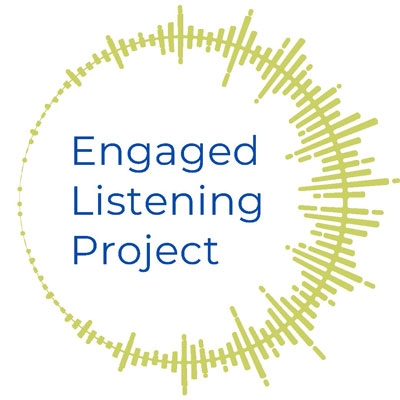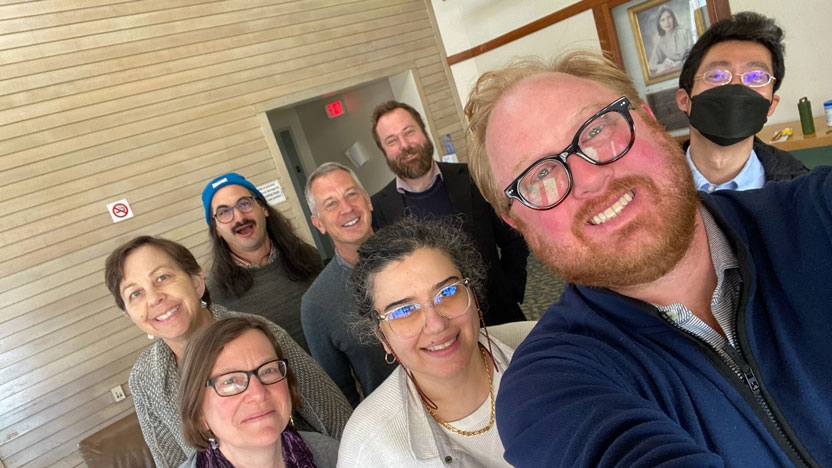Engaged Listening Project
Welcome to the Engaged Listening Project

The first Engaged Listening Project (ELP) initiative was a three-year effort designed by Middlebury faculty, staff, and students and supported by the Andrew W. Mellon Foundation. Almost 60 faculty members and a dozen staff were trained in dialogic practices.
This effort inspired the new Conflict Transformation Collaborative (CTC), launched at Middlebury in 2022.
Conflict transformation is the study and practice of moving from destructive binaries of high conflict to constructive engagements across differences. Across many different approaches in conflict transformation (restorative practices, mindfulness, mediation, dialogic practices, intercultural competence), listening is a foundational skill.
Join Us!
Please apply to the Spring 2026 Engaged Listening Project (ELP), supported by the Conflict Transformation (CT) Collaborative. ELP is a Pillar Two (Undergraduate Campus Life) program.
-
What is the role of educators in guiding students to navigate an increasingly complex world?
-
How can educators better facilitate engagement around interpersonal conflicts, personal values, fundamental rights, scientific facts, and controversial issues?
In the Engaged Listening Project (ELP), we consider engaged listening a crucial first step towards building connections and addressing these questions around conflict and change. Through participation in the cohort, faculty and staff develop a wide range of tools and exercises for navigating conflict and change within their sites of practice. Cultivating curiosity, critical self-reflection, compassion, and empathy, participants communicate across difference to help themselves grow and learn - and in turn foster these skills and dispositions with their students, colleagues, and beyond.
-
Participants will identify a site of practice where they will apply new approaches to listening and dialogue with students.
-
ELP is open to faculty and student-facing staff at Middlebury College.
-
To participate, ELP Fellows are required to attend a two-day opening workshop on February 5th & 6th from 9:00 am- 4:00 pm and a closing workshop on Friday May 1st from 2:30-4:30 pm.
-
In addition, each cohort will meet during the Spring 2026 either on Wednesday’s from 4:30-6:00 pm (Feb 11, Feb 25, March 11, April 1, April 15, April 29) or on Thursday’s 1:00-2:30 pm. (Feb 12, 26, March 12, April 2, April 16, April 30)
-
Please only apply if you can commit to one of these two-time blocks.
-
In return, fellows will receive a stipend of $3000 (fringe and indirect costs are deducted from the stipend.)
-
The ELP facilitators for the Spring are Miguel Fernández (Luso-Hispanic Studies), Brian Lind (Student Engagement), Amit Prakash (International and Global Studies) and Lida Winfield (Dance).
-
The application deadline is November 19th, 2025.
Please contact Lida Winfield (Head of the Pillar Two, CT undergraduate program) with questions.

Our Fellows
Starting in Spring 2023, ELPexpanded and adapted the cohort-based model of professional development to support listening and dialogue across differences. As before, this is a faculty and staff designed and led effort.
“This ELP session exceeded all my expectations. I don’t know what I thought it would be like, maybe more generic training, but that was not. It challenged me, encouraged me, supported me and, just as importantly, taught me immensely. The most important part, in addition to providing a community of like-minded people and educators, was the blending of community and content-building methodologies it explored. I came out learning something new out of every session and took those approaches into the classroom and into my everyday life.” – Past Fellow
Read more about Our Fellows.
Our Mission
The Mission of the ELP is to develop the skills, knowledge and dispositions necessary to turn towards each other in ways that foster our ability to welcome, recognize, and explore the contributions of each member of our community for the purpose of deepening our learning both individually and collectively. In our work together, we identify and intentionally remove barriers to welcome the full participation of every person in the spaces and places within Middlebury.
When we use the term ‘listening’ in this work, we are using the word to refer to a five-senses experience and not simply a process of hearing. When we greet each other whether with a bow, nod, handshake or hug, for example, we communicate complex information. The shape of our seating arrangement suggests purpose. We listen with our gaze, the tilt of our head, the postures we choose. When we speak about being engaged, we mean that we are giving our full attention to the people and topics before us as a demonstration of our mutual respect for each other as human beings.
We are all entering this work as educators who work to support students in different ways across the college. All of us are needed and are deeply important to the college community and students we serve. This is an opportunity tolearn from and with each other.

